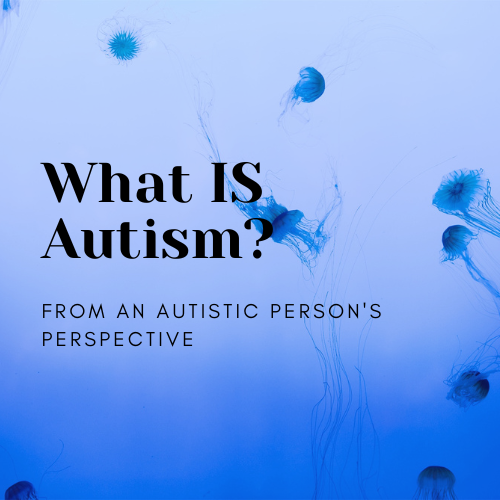What IS Autism?
It is hard to sum up autism in a sentence when autistic people are all different. But, if I had to, I would say that autism is a neurodevelopmental condition which affects the way I see, interact, experience and respond to the world around me.
Autism is not an illness, a disease, or something which makes me 'less'. It means my brain is wired differently and that means that I experience the world differently.
The DSM-5 (Diagnostic and Statistical Manual of Mental Disorders) says that autism is:
Persistent deficits in social communication and social interaction.
Restricted, repetitive patterns of behaviour, interests or activities.
Which cause clinically significant impairment in functioning.
This description is rubbish. Deficits are only deficits if we view difference to be a bad thing. Autistic people may communicate in different ways. Some are non-speaking and use AAC devices to communicate. Some are hyper-verbal. Difference isn't bad.
But some difficulties autistic people have in social communication and social interaction may include: understanding literal communication, metaphors and figures of speech; maintaining conversations; understanding social cues, social norms and social expectations & understanding non-verbal communication.
Then the DSM-5 talks about "restricted" and "repetitive" behaviour and interests. Again, framed negatively. Autistic people are likely to have intense interests in certain areas. These might be special interests, something they hyper-fixate on and engage with often. This can be SUPER COOL. Especially when autistic kids can teach you so much about a particular topic that most adults don't have a clue about. If an adult did, we would likely call them specialists in that area. Yet we pathologise autistic kids for this.
Autistic people may do things in a certain order. We may have routines we need to follow. We may repeatedly move in a way which feels comforting (aka stimming). We may find transitions and change very difficult. We need support in navigating these things.
The DSM-5 says traits have to cause "clinically significant impairment". Again, rubbish. It is true that many autistic people struggle in a world that isn't built for us. But it is not true that my functioning has always been impaired, especially as a child. I was still autistic.
So, what do I think Autism actually means? It means that my brain is wired differently. This means my brain thinks literally. My brain hyper-focuses and becomes fixated on particular topics. My brain finds some sensory experiences difficult and others incredibly joyful. Sometimes I experience such joy, I feel euphoric and everything else melts away around me, a.k.a autistic joy. Sometimes everything feels so overwhelming that I melt-down or shut-down. Melt-downs mean my brain has an uncontrollable neurological response to overwhelm.
Autism is so many things. The way that I think. The way my brain processes sensory input. The way my brain feels emotions, intensely, and the difficulty it has identifying and understanding them (alexithymia). The way I navigate social situations. The reason I hate change.
Autism, for me, means my brain wants to think in an organised way. Except, my brain is so overloaded that it is usually chaos. So I need familiarity and routine, and need to know what to expect so I can prepare for the demands which will be made of me.
Autism is complex. It is a spectrum, meaning that every autistic person experiences different traits to different intensities, and our functioning or the intensity of these varies day-to-day, even from minute-to-minute. I am autistic. I wish people understood it more.
